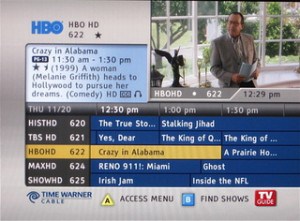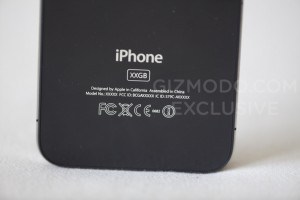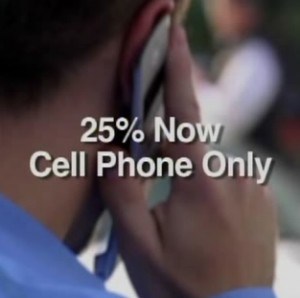 Time Warner Cable is convinced subscribers are confused about the enormous number of channels that occupy today’s cable dials. With today’s rapid growth in HD channels, the cable company is introducing some dramatic channel realignments for its customers in the Carolinas.
Time Warner Cable is convinced subscribers are confused about the enormous number of channels that occupy today’s cable dials. With today’s rapid growth in HD channels, the cable company is introducing some dramatic channel realignments for its customers in the Carolinas.
Next month, customers in the Triangle will join Time Warner Cable’s Common Digital Lineup, a project to align channel assignments throughout the two states. When complete, all digital channels will be located in the same place on the dial throughout the Carolinas. The company is also switching to a theme-based channel lineup. Each category will have its respective channels grouped together. Among them: news, general entertainment, sports, children’s programming, music, and movies.
For those in the northeastern states, this doesn’t represent anything new for the cable company — Time Warner Cable systems in New York, for example, have grouped digital channels into categories for years.
But the Carolinas realignment does make it considerably easier to locate HD channels, which will be aligned with their standard definition counterparts. For example, CNN will soon be found throughout the Carolinas on channel 400. Finding CNN HD becomes effortless – just put a “1” in front of the channel number — 1400. The Disney Channel is on channel 200. Disney Channel HD is easy enough to find — it’s now on channel 1200. Even local channels are easier to deal with. In Greensboro, for example, WXII, the NBC affiliate, will be on channel 120 for standard definition viewing or channel 1120 for HD viewing.
Complete channel lineup guides for the Carolinas are available from Time Warner Cable’s website.
[flv width=”432″ height=”260″]http://www.phillipdampier.com/video/News 14 Carolina In Depth Melissa Buscher TWC digital lineup changes 3-2010.flv[/flv]
Time Warner Cable’s House Organ, News 14 Carolina, delivers plenty of airtime to spokeswoman Melissa Buscher, who gushes about the channel alignment changes completed in Charlotte this past March. (3 minutes)
The new lineup will take effect for North Carolina customers on the following dates:
| Raleigh Area | |
| Fayetteville, Dunn, Fort Bragg, Wilson, Southern Pines | 6/2 |
| Farmville, Garner, Selma, Goldsboro, Seymour Johnson, Cary, Raleigh, Wake Forest, Youngsville, East Wake County | 6/8 |
| Henderson, Bunn, Carrboro, Durham, Chapel Hill | 6/16 |
| Greensboro Area | |
| Lexington/Davidson County | 6/14 |
| Winston-Salem, Forsyth, Bermuda, Run, Tomalex, Yadkin, Yadkinville, Surry, Stokes, Dobson, Mocksville, Mt. Airy, Elkin, King | 6/16 |
| Mebane, Alamance, Burlington, Greensboro, High Point, Archdale, Asheboro, Randolph County, Candor, Biscoe, Star, Rockingham | 6/22 |
The new channel lineup will be grouped as follows:
- 100’s – Local Broadcasters & Local Programming
- 200’s – Kids & Family, Learning & Discovery, Faith & Inspiration
- 300’s – Entertainment, Home & Leisure, Shopping
- 400’s – News & Information, Music
- 500’s – Sports
- 600’s – Movies
- 700’s – Premiums, Pay-Per-View Events
- 800’s – International
- 900’s – Music Choice
- 1000’s – On Demand
- 1100 and above- High Definition
 Meanwhile, a lot of other Time Warner customers would prefer to share their continued displeasure with Time Warner’s “new and improved” program guide and DVR configuration menus. Mystro Navigator has mystified a large number of customers who can’t stand the software and don’t understand why Time Warner radically changed it in the first place.
Meanwhile, a lot of other Time Warner customers would prefer to share their continued displeasure with Time Warner’s “new and improved” program guide and DVR configuration menus. Mystro Navigator has mystified a large number of customers who can’t stand the software and don’t understand why Time Warner radically changed it in the first place.
One Raleigh customer complains the software upgrade turned his DVR’s fast forward and rewind buttons into mud. The upgrade dropped the 4x fast forward option which rapidly scanned through recorded programming. Fast forwarding through commercials has become a nightmare because the box automatically rewinds about 10-20 seconds behind the point where the customer stopped fast-forwarding.
Buffalo and Rochester, New York customers have also given the software a hostile reception. Some customers in Buffalo have canceled Time Warner Cable over the upgrade and switched to Verizon FiOS. In Rochester, a few residents have noted it has become much more difficult to manage manual recordings or setting the DVR up to record series properly. The most common complaints:
- No apparent “jump to end” in playback
- Fast forward and rewind are not accurate
- Finding shows by title is laborious at best
- Recording shows and series has become needlessly complex by the changed menu structure
- No apparent 4x fast forward and reverse
- Program descriptions are heavily truncated on DVR recordings
- Erasing and managing recorded shows often drops you out of the DVR menu
- DVR recording is not consistent
- Configuring Navigator to work with HD sets is confusing for the uninitiated
- Extremely sluggish channel changing, responsiveness
Dealing with Navigator and the Time Warner Cable remote control, especially in the dark, should be an Olympic event. One Buffalo resident has thrown up his hands:
Time Warner reminds me of former Illinois Governor Rod Blagojevich. Both have severe technology handicaps. I watched the governor get fired on The Apprentice because he couldn’t use a cell phone or send an email or use the simplest technology.
Time Warner can’t seem to design a clicker that works. Mine has 63 buttons and looks like part of a 767 cockpit console. Hello? All I want is channel, volume and on/off.
The Time Warner remote doesn’t have a single on/off button — it has two – a ‘system’ and a “power” button. The engineer who designed that monstrosity should be dragged through the streets by a mob of angry senior citizens who must fumble with that thing every day.
Some tips have been circulating informally among Time Warner Cable engineers about how to deal with Navigator’s temperamental behavior:
Navigator Guide Data:
- Newly installed or downloaded guides can take up to 24 hours for all seven days of guide data to populate. In many cases, new installs may only go out by three days until a full 24 hours have completed.
- When Setting Up Series Recording for your first week with Navigator: (and even thereafter if you can help it) DO NOT DELETE SHOWS IN THE MIDDLE OF RECORDING THEM! Let Navigator do at least one complete recording of a series. If you need to delete a series, do it through the Series Manager, but before the recording starts. If you delete a series in the middle of recording it, Navigator will think it made an error, and will keep looking out for more episodes to record of that series.
- Navigator needs to see AT LEAST ONE instance of a series for the populated guide data to be able to record it. Remember, under Record Series With Options you can set up on what channel(s) the series should record, the number of episodes to keep, and set series priorities.
[flv width=”480″ height=”340″]http://www.phillipdampier.com/video/Time Warner Cable Dealing with Navigator 5-2010.flv[/flv]
Time Warner Cable produced these two videos to assist Navigator customers trying to understand how to record programming or set up their televisions to properly display cable programming. (3 minutes)


 Subscribe
Subscribe








